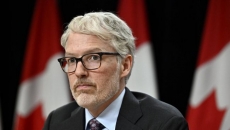Foreign Affairs Minister Mélanie Joly is readying an "Arctic foreign policy" aimed at preparing for a more tense time in international relations.
Joly tells Bloomberg News that this will involve working closely with NATO peers, including Finland and Sweden, who recently joined the military alliance.
“We need to assess the fact that we are no longer in a ‘high North, low tension’ reality, which has been the foreign policy of Canada for a long time and of the Arctic Council…
— Mélanie Joly (@melaniejoly) June 12, 2024
This is about the security of North America. This is about the security also of our Arctic allies.” https://t.co/FcHI8zsGLk
Her office says this is a foreign policy and not a strategy document, unlike the expansive plan Joly released regarding the Indo-Pacific region.
The news comes after recent visits Joly made to Stockholm and to Iqaluit to meet with territorial premiers.
The Liberals recently appointed former cabinet minister Carolyn Bennett as ambassador to Denmark, a role they said was focused on closer relations with Greenland.
The government's defence policy update released in April focused heavily on the north, though it fell short of the NATO spending target for military-related matters.
Joly says the policy document is needed because geopolitics in the region have changed quickly from a "low-tension" situation that lasted for decades, and that means new partnerships in military exercises, intelligence sharing and defence procurement are required.
The Liberals launched an Arctic and Northern Policy Framework in 2019, which focused on collaborating across jurisdictions on issues like education and health care, as well as military issues. Joly suggests this document will have a new, international chapter.
Following Russia's invasion of Ukraine in 2022, the U.S., Finland and other Arctic states released new strategies that included attempts to limit any co-opting of sovereign territory, though Moscow insists it has no such ambitions.
Greenland released its own Arctic strategy in February, which included a promise to establish a diplomatic mission in Ottawa. "Greenland encourages the establishment of a Canadian consulate in Greenland," reads the policy document.
In an analysis published last week, Canadian political scientist Marc Lanteigne argued Canada should follow suit, and use the office to better co-operate on goals by Canada and Europe to source strategic materials needed for a low-carbon world beyond China.
"With Canadian Arctic security requiring enhanced cooperation and communication with allies across the Atlantic, Greenland should be included in that dialogue given its location in the middle (in some cases literally) of the myriad security concerns now affecting the far north," wrote Lanteigne, a professor at the Arctic University of Norway.






